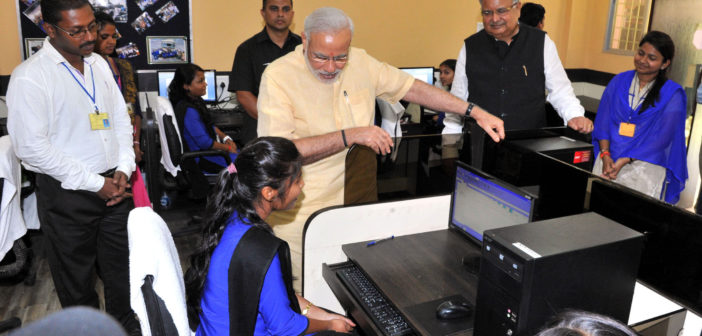Skill Development May Prove To Be Game Changer For Ailing Economy
As per Annual Employment-Unemployment survey, creating jobs is India’s key challenge. India needs to generate jobs that are formal and productive, the ratio of jobs created relative to investment should be quite high, have the potential for broader social transformation and generate exports and growth. Survey is also of the view that the apparel, leather and footwear industries can provide a viable solution, Reports Amit Bhanot, in the Cover Story of Governance Democracy & Politics (GDP), January Issue
General elections are around the corner, and the Union Budget that Finance Minister Arun Jaitley will present on February 1 is the Narendra Modi’s government’s last full-fledged Budget of its current term.That being the case, one can expect a lot of focus on the government’s proposals for skill development and employment generation, one of the key promises in its 2014 election manifesto. Considering that jobs are likely to be a top priority after the disruptions caused by demonetisation and GST rollout.
It is worthwhile pointing out that the government is working on a National Employment Policy (NEP) and a universal social security scheme, which may be announced in the Budget, along with higher allocation for the MUDRA scheme for financing entrepreneurship. In addition, a renewed focus on skill development and vocational training may also be seen in the Budget proposals.
If experts are to be believed then NEP is expected to have a sector-wise focus, more so on labour-intensive sectors like textiles and handloom, and other small and medium enterprises. It will likely provide them with incentives that are available for formal employment.
Importantly as per Annual Employment-Unemployment survey, creating jobs is India’s key challenge. India needs to generate jobs that are formal and productive, the ratio of jobs created relative to investment should be quite high, have the potential for broader social transformation and generate exports and growth. Survey is also of the view that the apparel, leather and footwear industries can provide a viable solution.
Labour Code And Indian Institute Of Skills Are Next Big Things
On an identical note, the Labour Code on Social Security, which is still under discussion, could also feature in the Budget. It aims to provide social security coverage to all workers, especially those in the informal sector. If experts are to be believed, many of the policies that are now taking shape will have a huge impact on the job market over the next few years.
As private investment recovers, a lot more jobs will be created. With 484 districts covered by Pradhan Mantri Kaushal Kendras for skill development, the government is now working on the Indian Institute of Skills to provide advanced courses such as energy efficient construction, industrial electronics and automation. While five such institutes are being planned, the construction of the first one, in collaboration with the Tata Group, will start in Mumbai soon.
As per the data available, under the Pradhan Mantri Kaushal Vikas Yojana, about 40.5 lakh candidates received training by mid-December. In 2017, as many as 11 lakh candidates were trained under the scheme, while another 3.7 lakh people were assessed and certified under the scheme of Recognition of Prior Learning. Similarly, 12.12 lakh candidates passed out from Industrial Training Institutes.
“Out of 2.5 crore candidates who have been skilled under Ministry of Skill Development and Entrepreneurship (MSDE) programmes alone, more than one crore have been trained in 2017,” said an official release. A lack of sufficient wage employment has also been a key challenge for the MSDE, which has been training youth in vocational skills, though many have often not found jobs.
Skill Development Legislation: A Need Of The Hour
Skill development has been one of the most talked about subjects over the past decade. Suddenly, in 2007, it was realised that India was a young country — it had tremendous potential for skill development, as all the ageing, developed economies would depend on India for skilled and trained manpower. Interestingly, the person behind this realisation was the late Dr CK Prahlad and his presentation on ‘India@75’. He wished to see 500 million skilled manpower in India by 2022.
Following this, the Centre announced the National Skill Development Mission (NSDM), a three-tier institution with the Prime Minister’s Office, Ministry of Finance and Planning Commission at the forefront. States, too, set up Skill Development Missions. The earlier National Skill Development Policy of 2009 had a target to train 500 million people by 2022, within a span of 13 years. The new policy of 2015 has targeted training 402.87 million persons by 2022.
But despite this huge target, even after four years of existence, National Skill Development Agency is yet to mark its presence and still lot has to be done in the direction of skill development. For instance, the Labour Market Information System, for matching the demand and supply of skilled workforce in the country, is still in isolation without roping in the National Career Centres of the Labour Ministry.
The role of the National Skill Development Corporation and the Sector Skill Councils also needs to be reviewed and this is a key challenge for Modi Government and particularly recently deputed Skill and Entrepreneurship minister Dharmendra Pradhan. Importantly from 2007 to 2017, 10 long years have been lost in experiments, and the future of a generation has been compromised.
Experts are of the opinion that the government must realise that there are challenges within of conflict, competition and overlap, and look at some fresh re-organisation.While building the infrastructure for skill development we much look into the examples of Germany and South Korea. While one has a system evolved over time and the other has a system created by the government, both have strong Acts by their respective Parliaments in this regard. Considering that India also needs a very strong Skill Development Act that ensures the future of the country.





